03
Apr

PRESS RELEASE
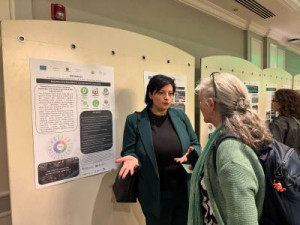 Yerevan, Armenia – April 3, 2025 – The European Union funded EU4Environment Resource Efficient and Cleaner Production (RECP) Project was prominently featured at the Green Agriculture Conference Armenia 2025, held on April 2–3 at the Armenia Marriott Hotel by the Regional Environmental Centre for the Caucasus (National Implementing Partner). This conference, themed “Enabling Sustainable Development in Armenia through Green Agriculture,” convened a diverse group of stakeholders to explore sustainable agricultural practices and promote environmental stewardship, green agricultural solutions, and technologies serving for efficient use of natural resources.
The RECP project, funded by the European Union and implemented by a consortium of international partners—including UNIDO, OECD, UN Environment, UNECE, and the World Bank—aims to assist Armenian Small and Medium-sized Enterprises (SMEs) in adopting resource-efficient and cleaner production methodologies. These practices are designed to enhance productivity, reduce environmental impact, and foster sustainable economic growth.
During the conference, the RECP project team presented key initiatives and accomplishments, including:
Yerevan, Armenia – April 3, 2025 – The European Union funded EU4Environment Resource Efficient and Cleaner Production (RECP) Project was prominently featured at the Green Agriculture Conference Armenia 2025, held on April 2–3 at the Armenia Marriott Hotel by the Regional Environmental Centre for the Caucasus (National Implementing Partner). This conference, themed “Enabling Sustainable Development in Armenia through Green Agriculture,” convened a diverse group of stakeholders to explore sustainable agricultural practices and promote environmental stewardship, green agricultural solutions, and technologies serving for efficient use of natural resources.
The RECP project, funded by the European Union and implemented by a consortium of international partners—including UNIDO, OECD, UN Environment, UNECE, and the World Bank—aims to assist Armenian Small and Medium-sized Enterprises (SMEs) in adopting resource-efficient and cleaner production methodologies. These practices are designed to enhance productivity, reduce environmental impact, and foster sustainable economic growth.
During the conference, the RECP project team presented key initiatives and accomplishments, including:
- RECP Demonstrations in SMEs: Conducting assessments and implementing RECP measures in 25 SMEs across sectors such as food production, construction materials, and chemical industries. These efforts have led to significant reductions in energy and water consumption, waste generation, and greenhouse gas emissions, while also achieving cost savings and improved production efficiencies.
- Capacity Building and Coaching: Providing tailored coaching programs for SME staff and RECP experts to facilitate the adoption of sustainable practices. This includes developing action and monitoring plans, identifying financing opportunities, and developing business plans for the implementation of RECP measures in SMEs, as well as creating a RECP savings catalogue to analyze economic and environmental benefits.
- Promotion of Circular Economy Principles: Integrating circular economy strategies to optimize resource use and minimize waste, thereby contributing to a more sustainable industrial ecosystem in Armenia.
22
May
Terms of Reference
National Coordinator Armenia
“Promoting Green Deal Readiness in the Eastern Partnership Countries (PROGRESS)”
Regional Project
BACKGROUND: Global: In December 2019, the European Union (EU) introduced the European Green Deal, a roadmap to transition the EU's economy towards carbon neutrality. The industry is expected to make significant contributions to achieving these goals by adopting cleaner production methods, improving energy efficiency, and reducing waste and resource consumption. Agriculture is a crucial sector in the Green Deal, with the "Farm to Fork Strategy" aiming to hasten the shift to a sustainable food system. Globally, the food value chain estimated to contribute to 37% of global GHG emissions and 33% of degraded soils, making the agriculture sector a significant focus in Nationally Determined Contributions (NDC) and environmental management. Demographic growth and climate change are increasing pressure on natural resources while on the other hand, more than one third of all food produced is lost/wasted. In developing countries, 40% of food losses occur at post-harvest and processing levels, while in industrialized countries, over 40% of losses happen at retail and consumer level (World Food Programme, 2021). Regional: The European Green Deal plays a crucial role in shaping future climate and environmental policies within the EU and its impact is felt on economic relations with the Eastern Partnership (EaP) countries. Despite the efforts made by EaP countries to transform their economy and implement initiatives in key sectors such as agriculture and industry, there is still a challenge in demonstrating how climate-oriented, resilient and green economic development can be achieved in practice. To tackle this, EaP countries need to accelerate the introduction of smart agricultural practices and of decarbonisation measures in industry. There is a need to increase knowledge on green technologies, enhance strategic capacities, and gradually align regulatory frameworks with EU standards and European Green Deal requirements. This is particularly crucial for MD, UA and GE (EU candidate status), as well as for AM and AZ for which EU market orientation has become highly relevant. Armenia: The agricultural sector in Armenia is expanding, with producers and distributors viewing the EU as a crucial export market based on the Comprehensive and Enhanced Partnership Agreement (CEPA) which aims to enhance trade relations. The fruit processing industry is well established with several export-oriented businesses. However, high costs along the value chains hinder the competitiveness of Armenian products in the EU market. Fragmented land ownership and low trust in cooperatives also pose challenges. The government provides subsidies for horticulture, but these are not based on "green" criteria. The Food Safety Agency has a strong commitment to enhancing food safety and quality standards in the country, but it has limited inspection capacities to ensure their broad application across the sector. Project: The project aims to support key stakeholders in Armenia, Azerbaijan, and Georgia across selected sectors in transitioning towards climate-oriented, resilient, and green economic development. This will be achieved through comprehensive capacity-building initiatives and impactful awareness-raising campaigns. In particular, in line with its institutional expertise, REC Caucasus is responsible for the adequate elaboration of concepts and implementation of regional knowledge exchange formats in EaP countries). REC Caucasus also conducts the implementation of business case/demonstration projects and awareness-raising campaigns at local and national levels in Armenia, Azerbaijan, and Georgia. The project focuses on three Outputs: Output I A capacity-building program will be developed to improve these support structures, so that they can provide better services to farmers and businesses in implementing climate-oriented, resilient or green economic measures in Georgia, Armenia and Azerbaijan. Output II, the project will support the design and the implementation of local awareness-raising campaigns with local advocacy groups and with national agencies to inform citizens about benefits of sustainable agro-products and climate-oriented, resilient and green economic development in Georgia, Armenia and Azerbaijan. Output III aims to disseminate knowledge and regional learning experiences. A regional learning and knowledge dissemination strategy will be developed for EaP countries, taking into account digital options, language, gender-related aspects, and conflict-sensitivity. The strategy will involve regional exchange formats such as events, peer exchange, digital platforms, and study visits to share good practices, evidence, and learnings. The Project Coordinator will work under the direction of the REC C Regional Director, and will closely collaborate with Country Coordination and Implementation Group (CCIG) Programme Partners, GIZ and the National Government Counterparts to assist with the organization and implementation of project activities in Armenia and at regional level. The Main duties include:
- Implement activities and ensure deliverables under Work package (WP I.1): Outreach support for implementation and replication of climate-oriented, resilient and green economic practices in agriculture or industry by public or private local support structures,
- Implement and ensure deliverables under Work package (WP I.2): Support to replication/scaling of climate-oriented, resilient and green economic practices in agriculture or industry to farmers and businesses with public or private local support structures,
- Implement and ensure deliverables under Work package (WP II.1): Design of local awareness-raising campaigns with local advocacy groups to inform about benefits of sustainable agro-products and climate-oriented, resilient and green economic development,
- Implement and ensure deliverables under Work package (WP II.2): Implementation of local awareness-raising campaigns with local advocacy groups,
- Implement and ensure deliverables under Work package (WP II.3): Design of national awareness-raising campaigns with national agencies to inform about benefits of sustainable agro-products and climate-oriented, resilient and green economic development,
- Implement and ensure deliverables under Work package (WP II.4): Implementation of national awareness-raising campaigns with national agencies,
- Implement and ensure deliverables under Work package (WP III.1): Elaboration of regional knowledge dissemination strategy and formats for EaP countries,
- Implement and ensure deliverables under Work package (WP III.2): Organization of regional exchange formats to share good practices and evidence/learnings,
- Support detailed planning of project activities at the national level, including identification, assessment and selection of national experts,
- Coordinate activities carried out by national experts, including review of reports/deliverables to ensure quality and timely delivery,
- Implement action based financial planning for implementation of project activities,
- Liaise with stakeholders and national focal points on smooth implementation of the project,
- Provide inputs for overview of the project progress implementation in the country, including work plans of activities with dates and locations as well as regular reports on implemented activities.
- Implement other necessary duties and activities deriving from the project implementation and necessary to achieve project results.
| Profile | The assignment is intended for a National Project Coordinator with proven competence and track record of achievement in the area of sustainable development and/or environmental management, circular policies, practices, and/or management. He/she shall have demonstrated experience in planning and implementation of training and capacity building initiatives, development and implementation of pilot projects and in design of local awareness-raising campaigns with local advocacy groups, sustainable agro-products and climate-oriented, resilient and green economic development. She/he should pose a team player and demonstrate ability to work by his/her own initiative. She/he must have excellent oral communication and drafting skills, in both English and Armenian. |
|
Required Competencies |
|
| Core Values |
|
| Core Competencies |
|
| Management and Leadership Competencies |
|
|
Minimum Organizational Requirements |
|
| Education | Master’s degree o r equivalent advanced university degree with specialization in relevant environmental, engineering, business management degree. |
| Experience |
|
| Languages | Fluency in written and oral Armenian and English, excellent communication skills. |
31
May
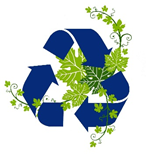
- The narrative about the organization and project being implemented
- Interviews with the project manager,
- Interview with stakeholders,
- Scenes from Dilijan and Vanadzor
- Working activities in Dilijan and Vanadzor communities park
- Field trips and trainings.
30
Sep
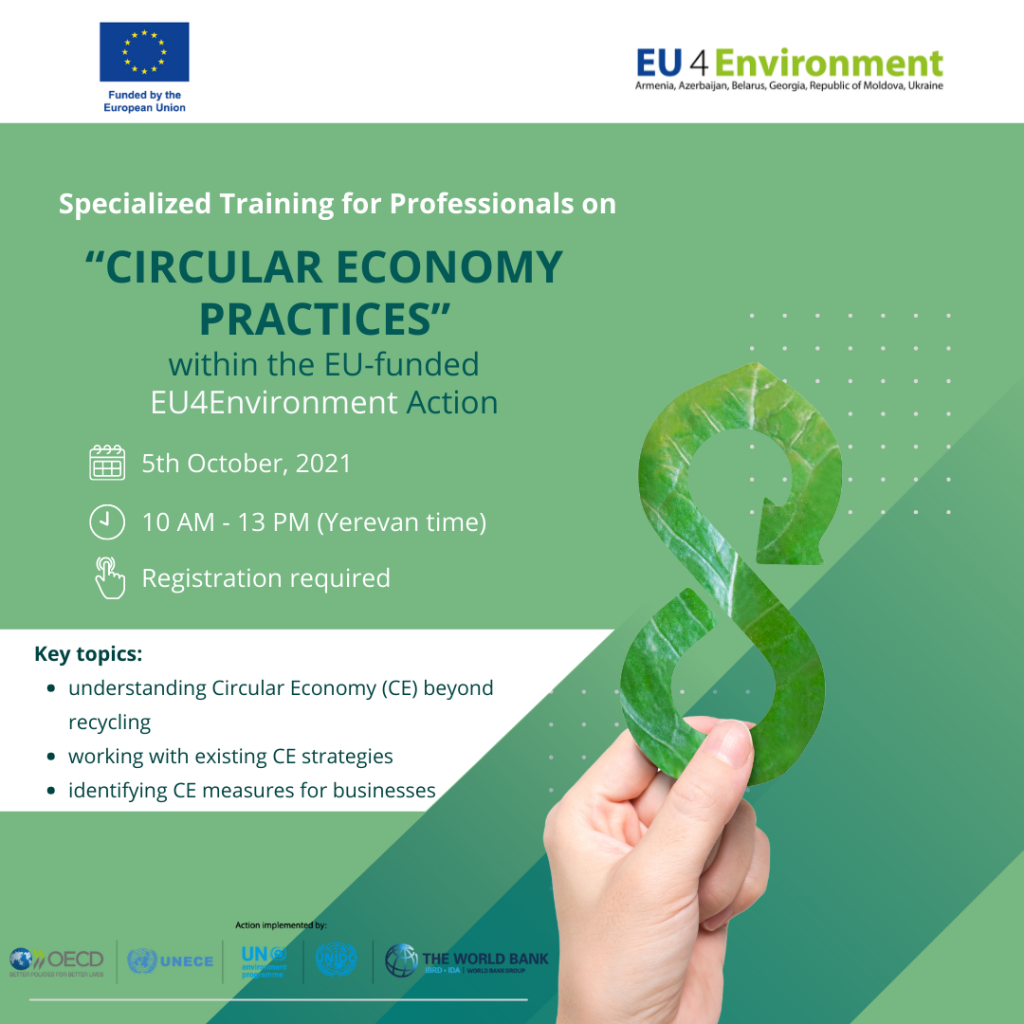
EU4Environment supports the instruction of professionals and entrepreneurs on the practices of Circular Economy by hosting an online specialized training in Armenia. Led by UNIDO, the training is divided into two parts (organized on different dates) and will focus on harnessing circular economy principles and systems-based approaches to explore ways in which entrepreneurs and professionals can redesign their business systems, products, and services to encourage the transition from a linear to a circular economy.
Date and timeThe first session takes place on the 5th of October 2021, between 10:00 – 13:00 (Yerevan time), online (via Zoom), in English (with simultaneous interpretation in Armenian).
Description
Organized within the European Union-funded EU4Environment Action (as part of the work implemented by UNIDO under the Result 2 Component “Circular Economy and New Growth Opportunities”), the event aims to embark participants on a theoretical, practical, and case study learning experience, relevant to illustrate and support the concept of Circular Economy.
Circular Economy is based on the principles of designing out waste and pollution, keeping products and materials in use as long as possible, and regenerating the natural systems. The training will focus on the best practices of Circular Economy, where materials from old products are reintroduced in the production of new ones. As much as possible, everything is reused, re-manufactured or, as a last resort, recycled back into a raw material or used as a source of energy.
Circular Economy also describes a new way of creating value, and ultimately prosperity, through extending product lifespan and relocating waste from the end of the supply chain to the beginning by using resources more efficiently (and more than once). Circular economy employs reuse, sharing, repair, refurbishment, remanufacturing and recycling to create a closed-loop system, minimising the use of resource inputs and the creation of waste, pollution and carbon emissions.
The current training will discuss the following topics:
- Circular Economy is more than recycling
- The existing strategies of Circular Economy and how to work with them
- Identification of appropriate circular measures for companies
- Identifying, implementing, and monitoring circular solutions for enterprises in Armenia
Participation
The training audience consists of professionals, entrepreneurs, and relevant stakeholders who wish to contribute to the circular economy strategies, policies, and practices. For more details, please see the event’s agenda.
Registration
You are kindly invited to confirm your attendance by filling in the registration form: https://docs.google.com/forms/d/e/1FAIpQLSd4CzjAex3cr3BQqm3lqcghjepCuwj3PuYMLoP5vNr_Iog6vQ/viewform?usp=sf_link
The training will be conducted through the Zoom platform (in English, with simultaneous interpretation in Armenian)
Training link: https://zoom.us/j/91003596918?pwd=enNmbjBBNGhqLzRiTmkwaFVMVTNidz09
Meeting ID: 910 0359 6918
Passcode: 474706
About
EU4Environment Action, funded by the European Union, aims to support Armenia, Azerbaijan, Belarus, Georgia, the Republic of Moldova and Ukraine to preserve and better use their natural capital, increase people's environmental well-being, and grasp new development opportunities. With a budget of some EUR 20 million for all six countries, EU4Environment is carried out from 2019 to 2022 with implementation support by five international partners: OECD, UNIDO, UNEP, UNECE and the World Bank.
For more information about EU4Environment: https://www.eu4environment.org/
For more information about the RECP project implemented under EU4Environment in Armenia: https://recp.am/
Contact details
For more information about the event, please contact Ms. Armine Hayrapetyan, Project Administrator, The Regional Environmental Centre for Caucasus Armenia
E-mail: armine.hayrapetyan@rec-caucasus.am
Tel: +37411575148
29
Sep
EU Funded Project “Joint Monitoring for Environmental Protection in BSB countries”
Training for Stakeholders: Methodologies and tools on Eco monitoring of Natural Parks and Protected Areas
9-10 June, 2021, Dilijan
Training objectives, expected outputs and outcomesTraining for Stakeholders: Methodologies and tools on Eco monitoring of Natural Parks and Protected Areas was aimed to build capacities of stakeholders on eco monitoring tools, methodologies natural parks and protected areas, use of smart monitoring platforms and measurement equipment.
Training program organized by Regional Environmental Center for Caucasus Armenia Branch Office and Green Age NGO for professionals from Dilijan National Park, Ijevan Forestry Branch and other stakeholders is to raise awareness on current situation of Armenian forests, sharing the key skills on UAV management, eco monitoring tools and practices for National parks and specially preserved areas.
The training was focused on UAV management in eco monitoring, processing and analyzing data obtained in field studies and terrain mapping. Field studies were performed to share practical skills in utilizing UAV technology.
Trainings provided support in terms of
- Enhancing local capacity and potential technical and research capacity for implementing environmental monitoring, use of smart monitoring platforms and measurement equipment.
- Improving participation and awareness raising within local communities, educational, government, scientific and civil society organizations in eco monitoring, protected area management, forest and biodiversity management and planning to address deforestation and climate change issues.
The training has covered the following topics:
• Adapted methodologies for eco monitoring of national parks and protected areas, tools, use of field equipment,
• Improved knowledge and skills of stakeholders on dealing with invasive species, impact of climate change on forests, protected areas and landscapes, natural parks,
• Smart monitoring tools and methodologies, water and air pollution measurement, UAV
• National and international legal frameworks on climate, biodiversity and desertification, related to protected area management.
• Monitoring the condition of natural habitats and the availability of invasive species and conduct the monitoring. methodology for implementing eco-monitoring, including collection of compatible data and topical information about the location and size of damaged areas, the types of pressure and the evaluation of potential sources and forms of threat, territories most dependent on climate change and anthropogenic influences etc.
Participants
The training sessions will include representatives from research and educational institutions working with national protected areas and landscapes, local professionals and local government, representatives of environmental and monitoring organizations, representatives of environmental NGOs, decision-makers. The meeting gathered participants from Ministry of Environment of RA (Ms. Anna Mazmanyan, Deputy Minister of Environment, Mr. Ara Khloyan, Director of Dilijan National Park SNCO, Forest Committee Mr. Ruben Petrosyan, staff of the Dilijan National Park, Ijevan Forestry Branch, NGOs and students of YSU Ijevan branch.
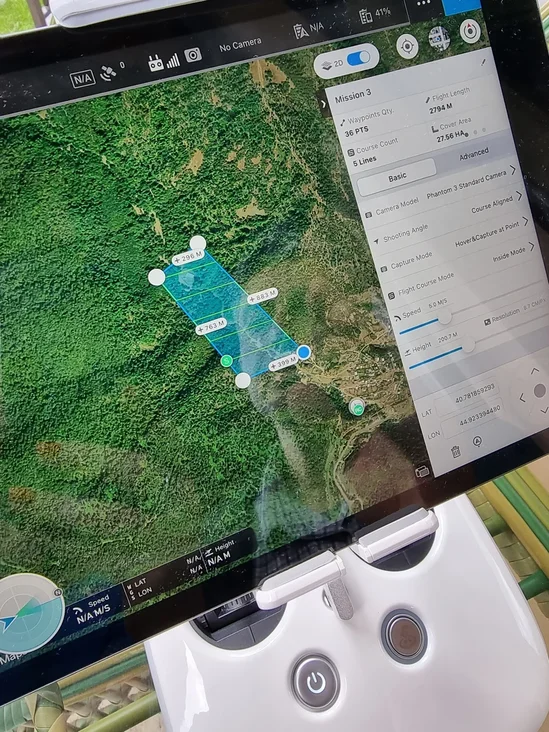
08
Aug
Invitation to Tender, EU funded BSB-884 ECO Monitoring Project
Subject: Invitation to tender for dron with multispectral camera, laptop and measurement devices Dear Madam/Sir, This is an invitation to tender for the above-mentioned supply contract. The following documents constitute the tender dossier:- Instructions to tenderers
- Draft contract, including annexes
- Tender form for a supply contract
11
Jun

![]()
Project description/goals: The general objective of EU4Environment is to help the partner countries preserve their natural capital and increase people's environmental well-being by supporting environment-related action, demonstrating and unlocking opportunities for greener growth, and setting mechanisms to better manage environmental risks and impacts. The program is implemented by a consortium of international partners, including OECD, UNIDO, UN Environment, UNECE and the World Bank.The project is aimed to provide description of support activities and advisory services on the application of Resource Efficient and Cleaner Production (RECP) in Armenia as a part of the implementation of the project “European Union forEnvironment (EU4Environment)” – a regional programme to be implemented in six Eastern partner countries (Armenia, Azerbaijan, Belarus, Georgia, the Republic of Moldova,and Ukraine) hereinafter called “EaP countries”. Project overall contributes to “Result 2. Output will introduce Circular Economy principles in Armenia by building national capacity and demonstrating RECP in SMEs”.Project uses RECP methodology and practices embedded on Circular Economy principles and applies practepiloted within EaP Green RECP Demonstration project (2013 – 2017).Project helps to increase productivity,product quality and competitiveness of SMEs in the country. Results of RECP assessments and implementation of RECP measures designed for selected industry SMEs will also serve to strengthen awareness and demonstrate benefits and best practiceson circular economy using Resource efficiency and Cleaner production.
RECP aims at
• Resource Efficiency: optimization of the productive use of natural resources (materials, water and energy); • Waste Minimization; Minimization of the adverse impact of production systems on environment and nature through reduction of wastes and emissions; •People’s well being: Minimization of risks to people and communities and enable their development. Project will be implemented in accordance with the following work packages WP 1. RECP Implementation Management and Institutionalization(Stakeholder meetings, networking activities, annual regional RECP events, alumni meetings and strategies to sustain RECP services)[1]. WP 2. RECP Industry Demonstrations (RECP Coaching and Assessment for 15 new and 10 EaP Green Demonstration SMEs, supported by RECP audits, assessment reports and recommendation packages for each invidivual company). As a result of assessments, companies will benefit from economic, environmental and social benefits, improved health, safety and environmental conditions. In particular, RECP audits will enable:- Reduction of production costs and support to technology enhancements;
- Increase in labor productivity and improvement of health and safety conditions;
- Improvement in product quality using Resource Efficiency and Cleaner Production methods and applications;
- Reduction of costs associated with input material, resources, water, waste production and pollution, reduction of GHG emissions and Climate change mitigation;
- Improvement of production conditions, company’s competitiveness and environmental performance;
- Improvement of the public opinion about the company.
08
Jun

- Lead development and implementation of technical aspects of activities nationally;
- Lead the conceptualization, development and implementation of GIS-based tools and analytical methods in support project partners;
- Support communicating about forest data and analysis to technical and non-technical audiences at national and international levels (e.g. by producing maps, graphs, figures, contributing to writing blog posts and articles);
- Respond to technical inquiries related to project work;
- Represent the project and give presentations at conferences and workshops, when necessary;
- Provide technical assistance to relevant processes such as land use planning, monitoring of activities, and other relevant areas of natural resource management nationally;
- Advise and support enhancing the compatibility of data and metadata structures with related systems, standards or regulations;
- Provide training for partners in GIS, remote sensing, management of forest databases, as well as in the application of forest data to key forest management processes;
- Promote the exchange of geographical data and metadata between the members of the team, and those of other related projects and institutions;
- Provide support in developing strategies for acquiring new datasets relevant to the project, in the context of identified thematic and geographic research priorities;
- Collection, compilation, or integration of external cartographic data as required for analysis or reporting needs;
- Prepare and analyze spatial data, including deriving spatial statistics by using geoprocessing tools (e.g. Model Builder and other analytical tools using ArcGIS and Python);
- Project management and support of other tasks outside of GIS when necessary;
- Create visually appealing and high quality maps and posters;
- National atlases for interactive forest resources and land use built and customized;
- Database with all relevant data (data relevant to forestry and land-use), including metadata;
- Completed technical trainings on use and upkeep of the portal and restoration opportunities map for government and other important stakeholders and national users.
- Degree from accredited university in Geography, GIS, Information Systems, Forestry, Natural Resource Management or another related field;
- Minimum of three years of professional experience relevant in GIS and data management;
- Proficiency with GIS software, including ESRI tools such as ArcGIS Online, ArcGIS Desktop, ArcGIS Enterprise and ArcGIS Hubs;
- Familiarity with website development languages and concepts including JSON notation, HTML, and CSS;
- Strong analytical skills;
- Understanding and experience of the forest sector in Armenia;
- A demonstrated willingness to take initiative and get things done with little guidance;
- Strong interpersonal skills and ability to work with teams of individuals and colleagues from different cultures and in different time zones;
- Ability to travel internationally, including the United States, when needed.
- Experience writing small programs and scripts using Python and or similar tools;
- Preference for experience working with international or government organizations.
07
Mar
03
Apr
- SEA system proposed in the 2014 Law of Armenia on "On the environmental impact assessment and expertise" (EIA Law) has been trialed, and amended with the new package of suggestive amendments to the Law, as well as the draft government decision on procedure of implementation of SEA in line with Espoo convention protocol.
- Public consultations in five regions of Armenia and Yerevan were conducted
- Substantive support for the implementation of the pilot project has been provided by REC Caucasus
- Dissemination of information about the pilot project and information materials to raise awareness of national stakeholders about SEA benefits has been implemented
- Series of capacity building workshops on specific SEA steps and analysis for government agencies, experts, civil society and specialists working in sectoral ministries,
- The project raised awareness and common understanding of the benefits of the SEA at national and local levels and in different sectors, including the benefits of public participation and the consultation of relevant authorities.
- The legal roundtable to introduce SEA procedure as stipulated by the draft legislation to the sectoral authorities and other relevant stakeholders (February 2017)
- Recommendations /guideline on practical application of SEA in Armenia (September - December 2017);
- Drafting the national SEA/EIA capacity building strategy to outline steps and actions needed to further enhance the environmental assessment system in the country (September - December 2017).
23
Mar
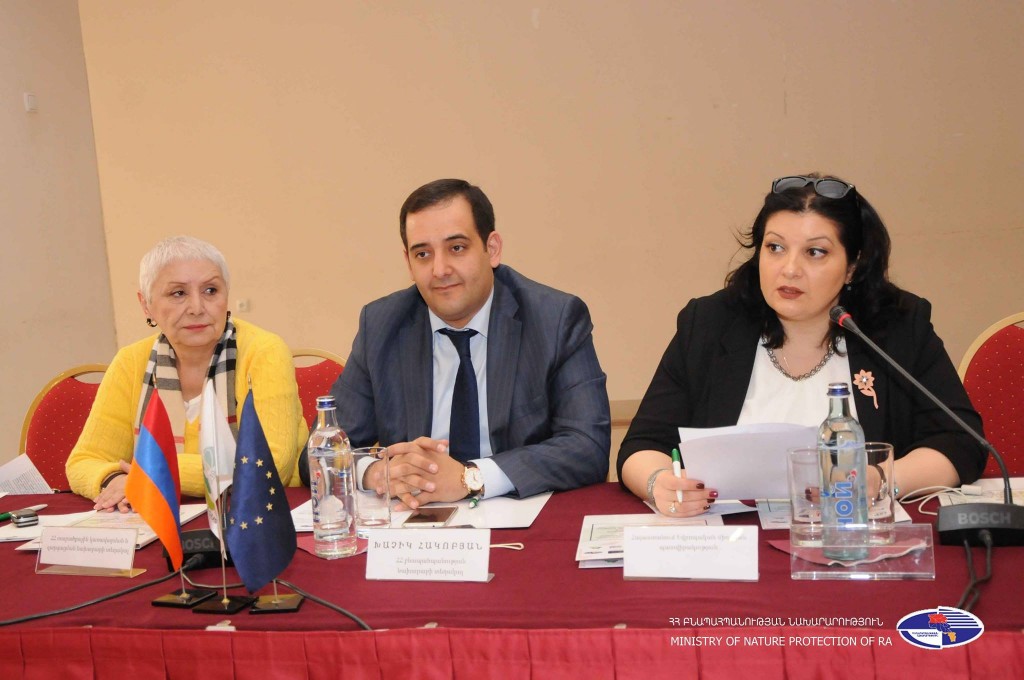
- Analysis of environmental and health problems revealed within the assessment, proposed main conclusions, mitigation measures and recommendations towards the waste management planning. Participants of the workshop will be introduced to the steps in SEA process conducted so far, as well as methodological approach applied in SEA pilot. The results of the discussion will be considered in the final version of the SEA report.
- The workshops also raised the awareness on SEA and contribute to enhanced capacities of the key actors in SEA including governmental planning agencies, decision-makers, NGOs and experts.
- The workshop also supported the RA Ministry of Nature Protection, RA Ministry of Territorial Administration in implementation of recommendations towards the “Strategic Development Plan, Road Map and Long Term Investment Plan for the Solid Waste Management Sector in Armenia” formulated by SEA in order to follow requirements of the Law on “Environmental Impact Assessment and Expertise” of Armenia (2014), and the UNECE Protocol on SEA, respectively.
06
Oct

The mission of the REC Caucasus is determined as “to assist in solving environmental problems in the Caucasus region through the promotion of co-operation at national and regional level among NGOs, governments, business, local communities, and all other environmental stakeholders, in order to develop a free exchange of information, in line with the principles of the Aarhus Convention; offer assistance to all environmental NGOs and other stakeholders; and increase public participation in the decision-making process, thereby assisting the states of the Caucasus in the further development of a democratic civil society”.
Founders REC Caucasus has been established within the framework of the “Environment for Europe Process” based on the decision made at the Sofia Ministerial Conference in 1995. The founding document of REC Caucasus – its Charter – was signed in September 1999 by the governments of Azerbaijan, Armenia, Georgia and the European Union. In March 2000 REC Caucasus was officially registered as an independent, not-for-profit, non-advocacy foundation in Tbilisi, Georgia. Structure Headquarters of REC Caucasus are located in Tbilisi, Georgia. The organisation has also branch offices in Yerevan, Armenia and Baku, Azerbaijan. REC Caucasus is managed by the Executive Body – a collegial Troika consisting of representatives from Armenia, Azerbaijan and Georgia. REC Caucasus is directed by the Board of Directors comprising representatives from the governments of the three founding states, representatives of NGOs from all three states, a donor representative and a science/ business representative. Donors The work of REC Caucasus is being supported by: European Commission (EC), Government of Germany, Government of the Netherlands, Government of Norway, Global Environment Facility (GEF), Deutsche Gesellschaft für Internationale Zusammenarbeit (GIZ), Eurasian Partnership Foundation, Kreditanstalt für Wiederaufbau (KfW), Organization for Security and Co-operation in Europe (OSCE), United States Agency for International Development (USAID), the Principality of Liechtenstein and others. Overall Goals REC Caucasus has been established:- to serve environmental stakeholders within and outside the South Caucasus region: national and local governments, NGOs, media, business, local communities, science, international community, teachers, students, children, etc;
- to contribute to the improvement of the Caucasus environment by facilitating introduction and implementation of global, European, regional and national environmental policies;
- to provide a gateway for dialogue, networking and cooperation among environmental stakeholders and partners at global, regional, national and local levels;
- National and Local Governments
- NGOs
- Media
- Teachers
- Students
- Business
- Science
- Community Based Organisations, as well as
- International Community.
- Biodiversity and forests
- Water
- Land
- Disaster risk reduction
- Green Economy
- Climate Change mitigation and adaptation
- Waste governance
- Cleaner production
- Advising
- Expert backstopping
- International events
- Capacity Building
- Confidence Building
- Consulting
- Integration of the concept of Green Growth into economic development of EECCA (sub-regional approach)
- EAP Task Force input to Rio+20.
27
Sep
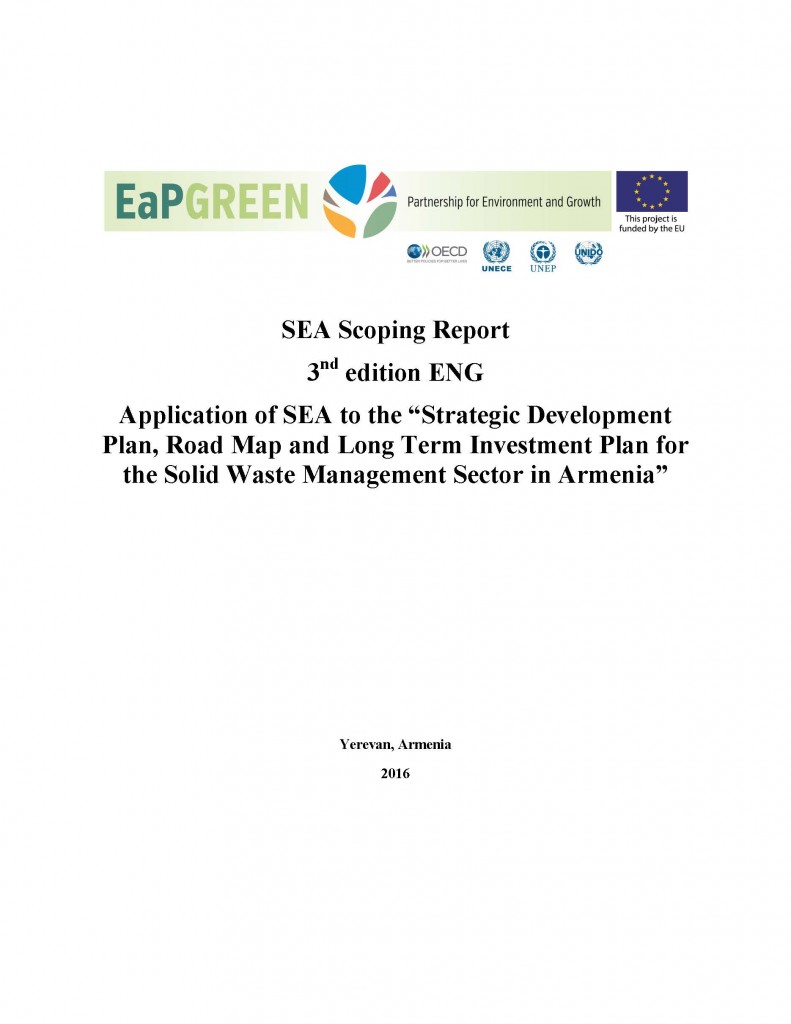
Scoping Report on Strategic Environmental Assessment on “Strategic Development Plan, Road Map and Long Term Investment Plan for the Solid Waste Management Sector in Armenia”
About the Project
Strategic Environmental Assessment (SEA) effectively promotes sustainable development by mainstreaming environment into economic development at the national, regional and local levels. SEA is a well-established, practical and efficient planning and environmental governance tool/system set out in the UNECE Protocol on SEA to the Convention on Environmental Impact Assessment (EIA) in a Transboundary Context (Espoo Convention). It ensures that strategic policy and legal frameworks and development plans in key sectors, including energy, water, waste management with likely significant adverse environmental effects are developed taking into account potential environmental and health effects and considerations. SEA ensures the identification of the most sustainable and cost-effective strategic development alternatives for attracting new investments and improving its environment. SEA also helps strengthening environmental governance through fostering transparency and consultation with relevant stakeholders and the public prior to the approval of plans and programmes which significantly improves public awareness and participation to the environmental decision making at national and local levels. SEA in a transboundary context can also greatly facilitate regional cooperation on environmental matters.
“SEA for Strategic Development Plan, Road Map and Long Term Investment Plan for the Solid Waste Management Sector in Armenia” /hereafter referred to as the “waste management plan” or the Plan/ was selected as a SEA pilot project in Armenia, as the Law stipulates that founding documents related to the waste management sector are subject to strategic assessment and expertise. The assessment and expertise processes should also include the organization of public discussions in the processes of SEA and expertise from the very start of the assessment process and until the decision-making stage / provision of the expertise conclusion/. The pilot SEA should be implemented in accordance with the provisions of the RA Law on “Environmental Impact Assessment and Expertise”, and the Protocol on SEA.
The aim of Scoping
The Scoping (or according to the Law ‘preliminary assessment’) is the initial stage of the SEA process. The aim of the Scoping stage is to identify environmental and health issues related to the plan or programme, which should be further analyzed within the SEA.
The Scoping is important for the efficiency of the SEA process, since it ensures that SEA focuses only on the likely significant effects which are relevant for the proposed plan or program.
The Scoping in SEA for the Waste Management Plan shall entail the following activities and analyses. According to guidelines of the scoping report that has been provided as support within the framework of the program, the definition of the waste management plan SEA scoping implies:
- Preliminary analysis of the environmental and health baseline,
- Identification of key environmental and health issues relevant to the Waste Management Plan,
- Identification of environmental and health policy objectives relevant for the Waste Management Plan,
- Identification of stakeholders and consultations with stakeholders.
The pilot project will reveal the opportunities via the practical application of legislation, will allow proposing recommendations as to how to improve the SEA process in Armenia, and will raise the overall awareness on the benefits of SEA. It will also inform the legal recommendations that will help to bring the national SEA legislation in line with the requirements of the Protocol.
09
Mar
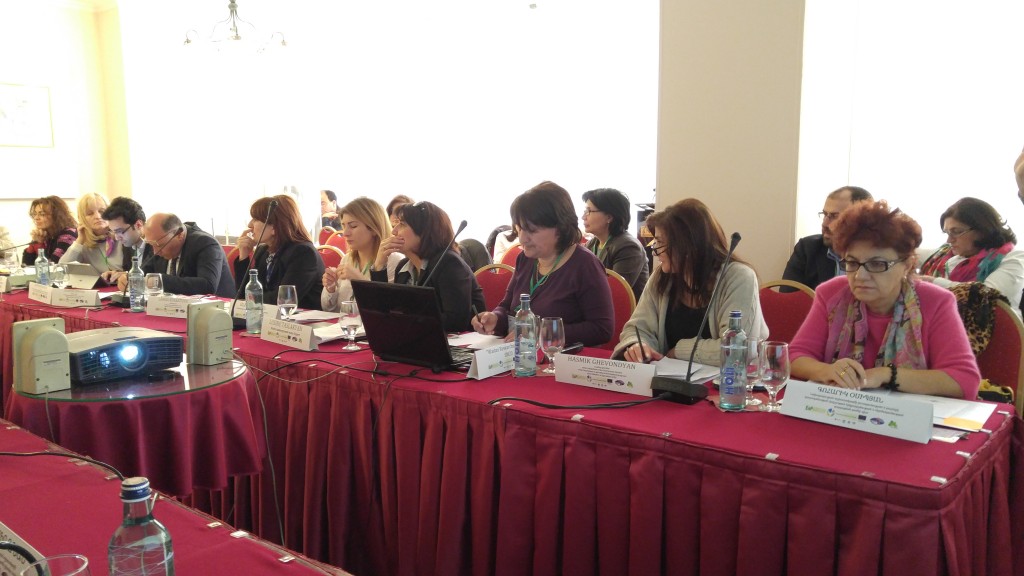
The training workshop on practical application of strategic environmental assessment (SEA) in Armenia organized by the Ministry of Nature Protection of the RA in cooperation with the United Nations Economic Commission for Europe (UNECE) and the Regional Environmental Center for Caucasus (RECC) in the framework of the EU funded Programme ‘Greening the Economies in the Eastern Neighborhood’ took place from 9-10 of March, in the Conference Hall of Ani Plaza Hotel, Yerevan.
The aims of the workshop were raising awareness and building capacities of various stakeholders, decision-makers, national experts on SEA procedure developed under the new national legislation, supporting implementation of the Pilot SEA of the ‘’Strategic Development Plan, Road Map and Long Term Investment Plan for the Solid Waste Management Sector in Armenia’’ and providing the enhancement recommendations to the Law based on the provisions of the UNECE Protocol on SEA.
The meeting was attended by Mr. Khachik Hakobyan, Deputy Minister of Nature Protection of RA, Mr. John Barker, International Aid/Cooperation Officer, EU delegation Armenia, Ms. Eleonora Grigoryan, Adviser to the Minister of Nature Protection of Armenia, Espoo Convention focal point, Ms. Elena Santer, EaP GREEN Project Manager, UNECE Secretariat, Ms. Nune Harutyunyan, National SEA Team Leader, Director REC Caucasus, Mr. Martin Smutny and Dr. Maia Gachechiladze-Bozhesku, International SEA Consultants to UNECE, Ms. Azganush Drnoyan, National Expert, Ministry of Nature Protection of Armenia, national SEA experts, NGOs, international organizations, RECC representatives, etc.
The participants of the workshop got familiar with the SEA procedure as required by the national legislation and the Protocol on SEA; the roles and responsibilities envisioned under SEA for the national and local authorities as well as civil society; methodological aspects of strategic environmental assessment for plan and programmes and approaches to preparation of the SEA scoping report.
The workshop was delivered by the experts from the Ministry of Nature Protection of the Republic of Armenia, national SEA experts, the UNECE SEA international consultants, and experts from the Regional Environmental Center for Caucasus Armenia National Office. The workshop deployed the format of interactive sessions with elements of practical case-based work.
UNECE international SEA expert Mr. Martin Smutni has introduced the Protocol on SEA and EaP GREEN Programme. The general obligation of the Protocol is to ensure that the necessary legislative, regulatory and other appropriate measures are taken to implement the provisions of the Protocol within a clear, transparent framework. UNECE SEA Team Leader, REC Caucasus ED Ms. Nune Harutyunyan introduced the pilot UNECE SEA project for the Strategic Development Plan in Solid Waste Management Sector of Armenia and stakeholder expectations. The main objectives of the project were presented. Planned works in the frames of the project were also outlined, particularly, development of a concept to make the results of the project public and increasing the awareness about SEA procedure and its benefits, report of SEA to be developed by the SEA national and international experts. UNECE international SEA experts Mr. Martin Smutny and Dr. Maria Gachechiladze-Bozhesku presented and facilitated a discussion for the scoping and baseline analysis in SEA. They introduced the importance and the objective of the scoping report which is it provides preliminary analysis of environmental and health conditions in the concerned area, identifies the key issues to be further addressed in SEA, outlines approach to further analysis, suggests early inputs into the planning process and presents a basis for preparation of the SEA Report. The international experts also introduced the proposed structure of Scoping report. Preliminary results of the SEA baseline analysis of the Strategic Development Plan in Solid Waste Management Sector of Armenia were presented by the SEA national experts, in particular the key findings, main challenges and difficulties, as well as the scope for further SEA analyses was introduced by them. A scoping exercise was carried out by Mr. Martin Smutny and Ms. Maya Gachechiladze – Bozhesku which was aimed at identifying the key environmental, social, and health issues to be addressed by SEA, identifying specific problems and concerns, areas of concern and geographic scope, likely linkages of environmental, social and health issues to the Strategic Development Plan and preparation of scoping matrix, data resources / limitations and stakeholders.02
Mar

- testing and demonstrating opportunities of practical application of the Law of RA “On Environmental Impact Assessment and Expertise”
- providing recommendations for environmental optimization and modifications of the selected plan/programme, and
- developing recommendations for further improvement of national legislative and institutional frameworks on SEA in a country
- Developing the concept, structure and substantive inputs for the guidance on practical application of the SEA in Armenia.
(a) Develop a concept for the publicity campaign to disseminate the results of the pilot project among the national stakeholders and raise their awareness about the SEA procedure and its benefits
(b) Ensure media coverage and visibility for SEA pilot implementation(through websites, notification in media)
(c) Develop information and promotional materials,
(d) Monitor the results of the publicity campaign.
Implemented activities Currently, two cooperation MOUs were signed by REC Caucasus and UNECE, targeting application of the SEA within the pilot Solid Waste Management Sector in Armenia, as well as the second one aiming elaboration of a new legal amendments package for the current national Law of the Republic of Armenia on Strategic environmental assessment and EIA. The national expert group on SEA has started its work and is currently devising the draft baseline analysis and scoping of the draft SEA report. Preparatory works are ongoing on two events planned for March – capacity building workshop on SEA for the national expert group and stakeholders, and legal round-table event to discuss the future strategy and legal amendment package on current law in accordance with requirements of UN Convention On Environmental Impact Assessment In A Transboundary Context (Espoo Convention) accessed by Armenia on 17th February of 1997.11
Feb
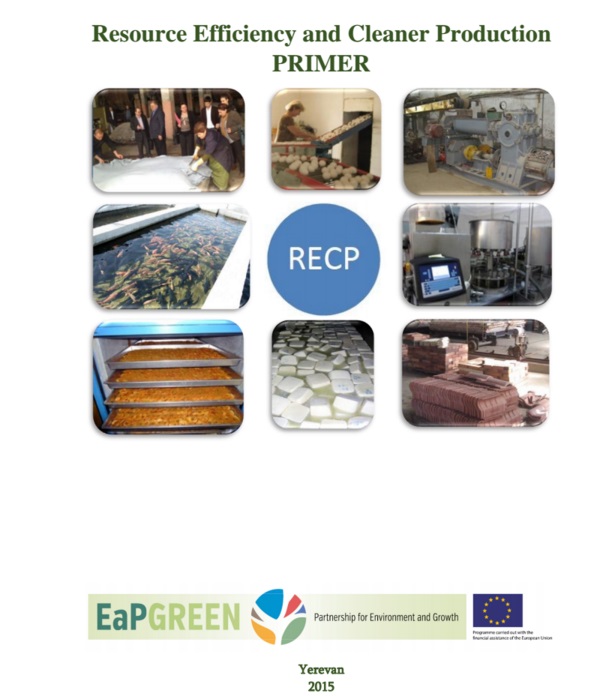
By mainstreaming RECP into business and production cycle it will become possible to support and achieve
- reduction of production and technology costs
- increase of work effectiveness
- possible improvement of the product quality
- reduction of waste and air pollution costs
- possible improvement of production conditions
- improvement of the company`s status in different negotiation processes
- Improvement of public opinion about the company.
We are hopeful that Primer will be become a practical tool for small and medium enterprises to improve enterprise performance by production of cleaner and more competitive products, as well as through efficient management of resources.
31
Oct
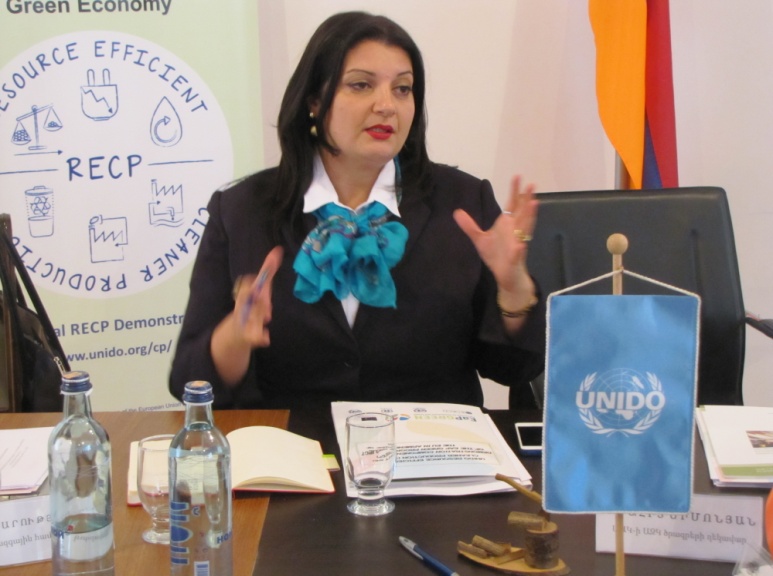
UNIDO Resource Efficient and Cleaner Production (RECP) Demonstration Component project organized the First RECP Stakeholder forum on Energy Efficiency within the context of RECP application for Small and Medium Businesses in Armenia. The forum took place on 30th of October, in the House of Culture of Ararat City Ararat Marz, RA.
The forum was aimed at implementation of the “Engage and learn” as well as “Engage and Refine” steps in RECP domestication process. The aim was to develop a domesticated argument for enterprises, governments, and civil society to consider and implement RECP, as well as demonstrate newly developed RECP introductory document “Primer”, and explain in what manner SMEs could benefit from RECP application etc. The aim was also enriching RECP by sharing experiences and perspectives, from enterprises, as well as ministries, leading civil society organizations, experts attended RECP forum, etc. to instill trust and facilitate understanding between stakeholder groupings, allowing momentum and partnerships for adopting RECP to naturally develop and mature (Agenda is attached).
The Deputy Minister of Nature Protection of RA Mr. Khachik Hakobyan, Deputy Minister of Energy and Natural resources of RA Mr. Hayk Harutyunyan, Ararat City Mayor Mr. Hayk Haykyan, and Head of UNIDO operations in Armenia Ms. Anahit Simonyan attended the forum. Representatives of international organizations, including UNFCCC, IFC, ARMSEFF, INOGATE, UNIDO RECP Ararat Green Club members, UNIDO RECP experts, SME representatives, representatives of institutes, producers and laboratories, media, NGOs and the Regional Environmental Centre of Caucasus team members, overall more than 40 participants were present (the list of participants is attached).
The Deputy Ministers, Head of UNIDO operations in Armenia and UNIDO RECP National coordinator welcomed the participants of the stakeholder forum and expressed their expectations from the organized forum.
UNIDO RECP National coordinator Ms. Nune Haruytunyan presented the importance of the energy efficient use for the country, its role and necessity in the RECP context, presented the aims and objectives of the effective and clean business directory, the role of the energy efficiency for the business. She spoke about customizing RECP approaches and proposing nationally appropriate rationales for uncovering business interest and desire to act on RECP. Ms. Nune Harutyunyan presented the key activities leading to green economy, introduced RECP project, RECP Techniques, methods and tools, improved housekeeping, better production process control, equipment modification, technology change, recycle and reuse of materials, useful byproduct and product modification (presentation is attached).
RECP Communication and Advocacy Expert Mr. Tigran Sekoyan presented the main short report aimed to promote debates about RECP domestication (comprising scaling up and mainstreaming) policy and strategy. He talked about RECP and in particular Energy Efficiency significance and benefits for every enterprise independent of the turnover, sphere of activity etc. (presentation is attached). RECP Communication and Advocacy Expert briefly presented also peculiarities of the Energy Consumption in RA and SMEs as well.
He also shortly presented RECP business benefits (expressed in Primer in plain language) while answering to the questions (presentation is attached).
All participants were given a voice they were able to express their standpoints without restrictions friendly or opposed. Forum welcome atmosphere allowed all participants to speak freely and nobody was singled out.
Thematical discussions were held; questions and answers, as well as recommendations were arisen during the forum among the representatives of different sectors and units about energy efficiency, cleaner production, state level policies, innovations, technologies, financial and economic tools, certificates for green businesses, etc.
Mr. Khachik Hakobyan suggested motivating mechanisms to be developed in the frames of the RECP project. Green certificates can be considered as a motivational tool and it must belong to private sector, not to the state. Certificates, which will demonstrate the proper performance of the organization based on RECP, accepted standards. He also mentioned that the certificate should provide long-term tangible results, thus there must be a unit, which will monitor the performance of those organizations to comply with the requirements.
Mr. Hayk Haykyan suggested to financially support communities, especially the smaller ones, which are lacking in own financial resources to implement improvements in terms of energy efficiency (replacement of the traditional lightening on the roads with energy efficient ones, modification of technologies wasting too much energy).
Mr. Hayk Harutyunyan said that RECP project application is especially important for Armenia, which is not rich with fossil resources. RECP and R2E2 Energy Efficiency projects should be respectively implemented in many as possible industrial facilities and public buildings. In Ararat city a project on energy efficiency will be implemented. He also added that the financial tools are also entering the market and that the risks on energy saving loans will change over time.
Ms. Anahit Simonyan mentioned that there is a problem of new technologies and innovations in majority of organizations and there is a need for investing new technologies in the businesses; they need investments with low interest rates to afford them. Anyway, RECP brings new thinking and new methods that must be used in production to become more competitive. The RECP family should decide: what needs to be done in country to localization and development of RECP way of thinking, principles, terminology and format in Armenia.
Mr. Gagik Makaryan suggested internationalizing the business organizations based on ISO standards accepted in the international markets. This is corresponding to the 5-th RECP business benefit, i.e. License-to-operate. He also presented the opportunities of UNIDO and RECC for the implementation of joint projects.
To the suggestion of one of the participants of the forum about promoting financial tools in the market Mr. Hayk Badalyan replied that the financial tools will enter the market from the next year and will rapidly grow as it will be available to many organizations. He added that auditing on energy must be promoted in industry sector as well as in residential and public buildings and SMEs must have knowledge on RECP and in energy efficiency.
SME representatives mentioned that because of RECP implementation there should be evident economic, environmental and social benefits for business and consumers, as well as government and the country as a whole.
RECP Ararat Green Club members, media, NGOs representatives said that no businessperson would refuse to get an advice from a wise and experienced expert, especially the advisor like RECP. The main issue is lack of information regarding RECP in the rural SMEs. Awareness companies are essential for promotion of the Primer.
Ms. Nune Harutyunyan found it mandatory to include RECP based education in educational system, starting from kindergartens to give primary information on RECP to students.
Ms. Dshkhuhi Sahakyan presented the best practices of ‘’Kashi’’ OJSC, where she made expert assessments during the first RECP project phase. She introduced the assessment results from the visits.
Mr. Artur Tsughunyan made short presentation and showed that by combining electric and solar drying units a technology change for dry fruit production was performed in “Ervandashat agricultural association” consumer cooperative company. As a result of using solar energy the saving of electricity amounted to around 75% or 4.7 kWh annually. The reduction of CO2 emissions amounted to 2 tons. The annual saving is equal to 200 thousand AMD and the repayment period is 10 months.
Mr. Mkrtich Jalalyan said that RECP implementation would create a favorable situation regardless of the political environment and corruption risks that present in any country. He described the RECP benefits in HATM household union that produces construction materials and furniture currently used administrative spaces were optimized and matched with current production volumes i.e. improved housekeeping RECP technique was applied.
Mr. Hrant Ter-Gabrielyan found that there are gaps in the estimations done in organizations or public institutions which indirectly affect the savings. He also added that in case of green certificates the number of economic tools would increase in the market.
UNIDO RECP experts mentioned that implementation of RECP tools, methods are necessary for any industry and any company operating in a market economy and enterprises can contribute by active participation and promotion of RECP.
Mr. Aram Gabrielyan said that Natural resources are limited and humankind must fit in the limit of natural resource use.
Mr. Levon Vardanyan conclude that consistent work is needed to implement for domestication and development of RECP principles, tools, methods, terminology in Armenia and the Primer is the first step.
Other suggestions and recommendations included setting green filter as a clean production tool rising awareness on energy efficiency through newsletters, booklets, educational programs, creating collective partnership conditions (the document already exists on this issue) and using it as a platform, promoting energy audit and RECP audit service, as well as developing and piloting scale-able model for RECP in small businesses to show how business can achieve RECP benefits.
Ms. Nune Harutyunyan gave information about the key topics and forums. She invited the participants to take part in the planned forums for the next topics. The main points arisen during the forum were summarized and there were expectations to have some tangible results in energy efficient and cleaner production in near future.
25
Oct
28
Apr
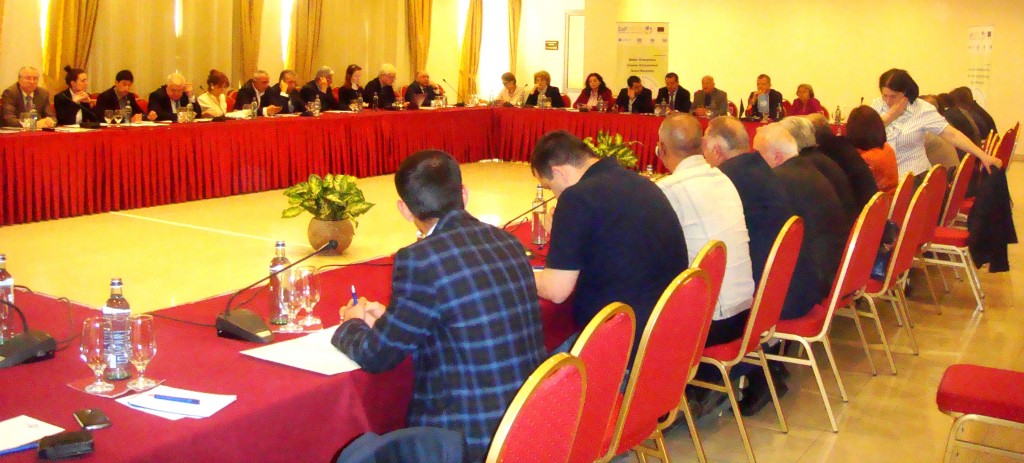
13
Mar
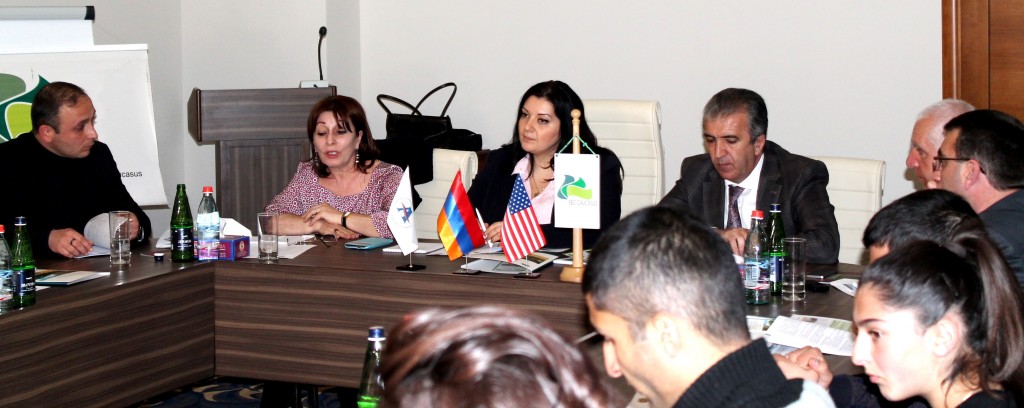
- Problems and urgent issues uncovered in Jermuk city;
- Active involvement of local authorities and city representatives in solving environmental issues of their own city;
- Attracting government representatives` and population attention on vulnerable issues of the city;
- Presenting the environmental description of Jermuk city about various sectors in Jermuk book;
- Calculating financial resources needed to solve the major environmental issues of the city;
- Presenting the city of Jermuk internationally (during conference in Geneva).
- Problems and urgent issues uncovered in Jermuk city;
- Active involvement of local authorities and city representatives in solving environmental issues of their own city;
- Attracting government representatives` and population attention on vulnerable issues of the city;
- Presenting the environmental description of Jermuk city about various sectors in Jermuk book;
- Calculating financial resources needed to solve the major environmental issues of the city;
- Presenting the city of Jermuk internationally (during conference in Geneva).
28
Aug

01
Aug
20
Jun
The Regional Environmental Centre for the Caucasus (REC Caucasus) is an independent, non-for-profit organisation, established to assist in solving environmental problems as well as development of the civic society in the countries of the South Caucasus. MISSION The mission of the REC Caucasus is determined as “to assist in solving of environmental problems in the Caucasus region through the promotion of co-operation at national and regional level among NGOs, governments, business, local communities, and all other environmental stakeholders, in order to develop a free exchange of information, in line with the principles of the Aarhus Convention; offer assistance to all environmental NGOs and other stakeholders; and increase public participation in the decision-making process, thereby assisting the states of the Caucasus in the further development of a democratic civil society”. FOUNDERS OF REC CAUCASUS REC Caucasus has been established within the framework of the "Environment for Europe Process" based on the decision made at the Sofia Ministerial Conference in 1995. The founding document of REC Caucasus - its Charter - was signed in September 1999 by the governments of Azerbaijan, Armenia, Georgia and the European Union. In March 2000 REC Caucasus was officially registered as an independent, not-for-profit, non-advocacy foundation in Tbilisi, Georgia. OUR DONORS The work of REC CAUCASUS is being supported by: European Commission (EC), Government of Germany, Government of the Netherlands, Government of Norway, Global Environment Facility (GEF), Deutche Gasellschaft für Internationale Zusammenarbeit (GIZ), Eurasian Partnership Foundation, German Financial Cooperation (KFW), Organization for Security and Co-operation in Europe (OSCE), United States Agency for International Development (USAID), the Principality of Liechtenstein and others. Work of the organisation is supported by the EU, US EPA, Denmark, Germany, Switzerland, Italy, the Principality of Liechtenstein, the Netherlands, Critical Ecosystem Partnership Fund (CEPF), etc. STRUCTURE Headquarters of REC Caucasus are located in Tbilisi, Georgia. The organisation has also branch offices in Yerevan, Armenia and Baku, Azerbaijan. REC Caucasus is managed by the Executive Body – a collegial Troika consisting of representatives of Armenia, Azerbaijan and Georgia. REC Caucasus is directed by the Board of Directors which comprises representatives from the governments of the three founding states, representatives of NGOs from all three states, a donor representative and a science/ business representative. OVERALL GOALS REC Caucasus has been established:THE REGIONAL ENVIRONMENTAL CENTRE FOR THE CAUCASUS
- to serve environmental stakeholders within and outside the South Caucasus region: national and local governments, NGOs, media, business, local communities, science, international community, teachers, students, children, etc;
- to contribute to the improvement of the Caucasus environment by facilitating introduction and implementation of global, European, regional and national environmental policies;
- to provide a gateway for dialogue, networking and cooperation among environmental stakeholders and partners at global, regional, national and local levels;
- National and Local Governments
- NGOs
- Media
- Teachers
- Students
- Business
- Science
- Community Based Organisations, as well as
- International Community.
- Integration of the concept of Green Growth into economic development of EECCA (sub-regional approach)
- EAP Task Force input to Rio+20.
- Sub-regional training for inspectorates “Improving environmental compliance assurance in the Caucasus” (2003) – in cooperation with OECD EAP Task Force;
- Government needs assessment (2004);
- Strategic Environmental Assessment (SEA) Capacity Building in the South Caucasus: Towards a Coherent Strategy (2004-2005)
- Introducing SEA in the South Caucasus: Learning Lessons and Transferring Experiences (2006).
- setup new small companies and create additional jobs that contribute to sustainable development and improved quality of life of the local communities;
- implement pilot projects on environment rehabilitationon;
- train community members in additional professional skills to ensure a more sustainable economic base in small villages of the Caspian coastal area.
The overall objective of this project is to contribute to sustainable development and minimise environmental impact from industrial sector by stimulating small and medium size enterprises (SMEs). The objective will be reached via increase of SME’s capability in the preparation of financial documentation for CP and EE projects. The increased possibility for getting the financial resources from local and international financial institutions, will improve their (SME’s) operation capabilities to become more economically efficient, while becoming more environmentally friendly and reducing their demand on locally scarce resources.
Project scope: Armenia, Azerbaijan, Georgia
Donor: Government of the Netherlands22
Apr
Development of new modules for international bachelor and master programmes in sustainable tourism management

Duration
15.11.2012 – 14.10.2015 (3 years)Objective
A multi-country project to modernize curricula in sustainable tourism management (SuToMa) and develop a joint understanding about the principles.Occasion
Tourism is a regional priority for the Caucasus but an underdeveloped field in all three countries. Especially for Europeans the entire Caucasus is a fascinating area with a rich cultural history and biodiversity/the cradle of European mankind.Our perspective
Only a sustainable regional development within the tourism sector meets the expectations of these target groups and guarantees a long- term economic, social and ecological welfare for local people and following generations.Partners
30 universities, enterprises and NGOs in Azerbaijan, Armenia and Georgia. European partners in Ireland and LatviaTargets
12 new modules for innovative topics, such as- integration of theory and praxis,
- intercultural communication,
- eLearning and IT technologies, to be implemented in existing and new BSc. and MSc,
- study programmes, accredited with ECTS
- interdisciplinary approach such as agriculture, tourism and business studies.
Outcomes
- a common understanding of sustainability and regional development
- modules created according to the Bologna standards
- comparable qualification standards
- new methods and materials for teacher and tutor training
- formal integration of practical placements in the curricula
- regular monitoring of milestones
- implementation of eLearning platform
- new international academic cooperation
Chronology
Development of modules: first year Training of teachers: second year Testing with students: third year31
Oct

- deforestation and climate change issues
- secured land tenure and forest community rights
- rural poverty reduction
- diminishing regional and national tensions and the risks of insurrections let by alienated elements among population
- conservation and sustainable development of local communities
- forest management (inventory, monitoring, harvesting, reforestation, protection)
- socio-economic aspects
- consumption of non-timber resources
- usage recreational potential.
Representatives of Ghebi Community proposed initiative to cultivate nut-trees on the adjacent area of the village. Mentioned initiative was shared and supported by the representatives of local authorities. As a result 2000 walnuts seedlings (from 3 to 5 yaer) are being planted on three plots (5 ha in total) in surrounding areas of Ghebi community. Villagers from the community actively participate in planting activities. At the same time they have been provided with suitable practical skills and knowledge on planting and maintain activities of wallnuts seedlings, as a follow up activity. It should been mentioned that nut-tree (Juglans regia) is included in the Red List of Georgia as vulnerable species.
12
Jun
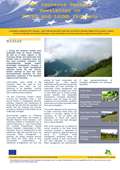
23
Mar
- Developed methodology(ies) for valuation of actual damage caused to the environment by economic activities and recommendations to the government provided
- Benefits of using elaborated methodology demonstrated through pilot activities and best practices are disseminated
Cooperation and Participatory principle
Project development requires close operational relations among the state stakeholders, enterprises and organizations operating in the economic areas and sectors mostly vulnerable in terms of overexploitation of natural resources and damage being caused to the environment, populations living in corresponding territories and local self-governance bodies. This principle of cooperation can be successful only if it is based on a common goal and mutual trust among parties. The Project implementation and recommendations accepted in the process of implementation require an active public involvement during the whole process, while successful public relations require a two-way communication. Firstly, public participation means raising the level of awareness through informing all stakeholders about the scale and aims of their own efforts, environmental issues and priorities, and possible actions to address the most pressing issues. Active involvement of non-environmental government regulatory bodies (Ministry of Economy, Ministry of Finances, Tax Authorities, etc.) into the project since the beginning will be ensured.Principle of using best international practices
In order for the project to achieve multiple results and be successful, the experience of realization of similar projects in other countries (preferably, eastern European) implemented by international environmental or financial organizations can have essential importance. OECD experience, and, particularly, activities conducted under the framework of EAP TF in the field of assessment and introduction of economic instruments in the EECCA region will be used. The EAP Task Force has done extensive work on helping environmental regulatory agencies in EECCA countries to modernize their systems of economic instruments for environmental protection, particularly pollution and product charges. The project should also use an accumulated experience and materials from “Monetary Penalties and Liability” EECCA RECs Joint Projects.Principle of integrity
The procedure for classification of issues related to environment should make it possible to monitor environmental issues from various viewpoints and integrate health care, environmental, economic and social aspects of environmental degradation, which, ultimately, comprise the context for sustainability. Project Duration and Budget Project Duration: 15 months02
Nov

Agenda for the VII Annual International Conference
November 10, 2011
10:00-10.30 Opening Ceremony
10:30-11:00 Welcoming Remarks: Giorgi Khachidze Minister of Environment Protection of Georgia Boris Iarochevitch Deputy Head of Delegation Delegation of the European Union to Georgia Dr. Felix Näscher Director General, the Office of Forests, Nature and Landscape, Principality of Liechtenstein 11:00-11:30 General Introduction of the Issue: Sophiko Akhobadze Executive Director of the REC CaucasusSession One
11:30-12:00 National Climate Change Policies of the South Caucasus countries and their positions towards COP 17 Chairman : Giorgi Zedginidze Giorgi Zedginidze Deputy Minister of Environment Protection of Georgia Samvel Amirkhanyan Advisor of Minister, Ministry of Nature Protection of Republic of Armenia 12:00-12.30 Discussion: Questions: - Country and region specific institutional and technical challenges and needs SC countries face in meeting post Cancun reporting obligations - How support can be directed to meet these challenges - Are the funding mechanisms in place and how much work has been done in this area that we can use as a starting point - Challenges for South Caucasus in evaluation of CC impact - National and regional priority issues: adaptation measures, effectiveness, donor co-operation - Prospects for co-operation 12:30-13:00 Coffee BreakSession Two
13:00-14:00Climate Change adaptation perspectives of Civil Society
Chairman: Nino Chkhobadze
ELKANA- Presentation "Importance of agricultural biodiversity and sustainable agriculture for the climate change adaptation in Georgia" Mariam Jorjadze, Elene Shatberashvili RECC BO ARMENIA Approaches to identification and implementation of adaptation response to climate change impact for conservation and sustainable use of agro-biodiversity in arid and semi-arid ecosystems of Armenia Dshkhuhi Sahakyan/Armine Simonyan ECOVISION Dedoplistskaro Municipality Sectoral Planning on the Basis of Landscape- Ecological Background- Gia Sopadze ECO TEAM Presentation Raising awareness on issues of climate change and promotion of renewable energy sources in Armenia and world – Artashes Sargsyan SUSTAINABLE DEVELOPMENT Presentation Energy security of the Azerbaijan Republic and the problem of sustainable development of alternative energy sources Fikret Djafarov ENERGY, ECOLOGY, ECONOMY Presentation Influences of Regional Change of the Climate on the Environment- Shamil Movsumov ARMENYAN Mainstreaming Climate Change Considerations into Tourism -Zhanna ECOTURISME ASSOSIATION Galyan 14:00-14:30 Discussion 14:30-15:30 Lunch Session Three 15:30-16:30 Climate Change adaptation perspectives of the Academia Tamaz Chelidze “On the climate change in Georgia in the past, at present and in the future: what should be done for filling the gaps “M.Nodia Institute of Geophysics of Iv.Javakhishvili Tbilisi State University
Nicholas Meskhidze- “Climate Change and Sustainable Development with the Emphasis on the Southern Caucasus” North Carolina State University, Raleigh, NC, USA George Fayvush On the impact of global climate change on the flora and vegetation of Armenia Institute of Botany, National Academy of Sciences of Armenia Khayyam Rahimov Assessment of the impact of expected cllimate change on population of Azerbaijan and possible adaptation Climate and Agroclimate Department of Geography Institute, NASA. Tahira Gahramanova Several aspects of Geosystem climate change influenced by wind erosion within the coastal region of Azerbaijan. Baku State University Session Four 16:30-16:40 Climate Change adaptation perspectives of the business sector Maharam Mehtiyev Presentation -The role of International Organizations and private sector for adaptation to climate change-SOCAR 16:40-17:00 Discussion 17:00-17:20 Coffee Break Session Five 17:20-18:30 Climate Change adaptation perspectives of international Organizations GIZ Dieter Muller, Climate Tolerant Rehabilitation of Degraded Landscapes in Georgia Project Director UNDP Presentation Climate Change Adaptation – Challenge and Opportunity for the Caucasus- Marina Shvangiradze- Georgia WWF Presentation ‘Climate Change Related Projects Implemented by WWF-Caucasus Programme Office” Ilia Osepashvili, Forest Officer RECC Presentation” Sustainable Land Management for Mitigating Land Degradation and Reducing Poverty in the South Caucasus Region” UNDP theses- Adaptation to climate change impacts in forests and forestry of Armenia –Piloting selected adaptation measures in forest regeneration and forest rehabilitation to enhance the resilience of mountain forests to climate change, Essi Ulander, Armenia CENN Presentation Climate Change Adaptation and Disaster Mitigation (CCADM) project Tamar Mtvarelidze UNDP/GEF “Role of Collaborating Partners in Implementation of Climate Change Mitigation Projects at Local Level: Case Studies of GEF SGP Funded Projects in Armenia” Vardan Tserunyan 18:30-19:00 Discussion19:00 Closure of Day I
Wrap up of the first day and introduction of next day’s parallel discussion sessions 19:30 DinnerNovember 11, 2011
Session Six 10.00-11:30 Dialogues on Climate Change: Parallel Discussions 1: Integrating climate change risks into national development policies, plans and strategies Moderator: Aram Gabrielyan (FP UNFCCC) 2: Identifying financing for adaptation initiatives Moderator: Nino Antadze(UNDP Georgia) 3: Priority directions for climate change adaptation Moderator: Oqtai Djafarov (FP UNCCD) 11:30-12:00 Coffee Break Session Seven 12:00-13:00 Reports from parallel discussions: Group 1 Group 2 Group 3 Session Eight 13:00-14:00 Common Problems in the Region and Potential Ways of Resolving Chairman: Grigol Lazriev, Division of Hydrometeorology and Climate Chnge, Ministry of Environment Protection Of Georgia 14:00-14:30 Closing of the Conference Chairman: Giorgi Zedginidze Edgar PIrumyan President of the REC Caucasus International Advisory Council 14:30 Lunch20
Oct
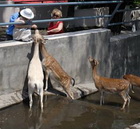
10
Oct
2) Enhanced legislative, administrative and operational civil protection capacities
3) Improved information , awareness and participation.
4) Partner countries are well informed about EU Civil Protection Mechanism and able to effectively collaborate
5)Needs for a possible of cooperation with Eastern partners, end of programme (Phase II) are identified.
Indicators:
1) Knowledge products (booklets, manuals, newsletters etc.) are created and disseminated in appropriate languages and made available on the internet. Information is shared, transferred and used at policy and management levels. Educational materials are developed in Armenian, Azerbaijani and Georgian languages and distributed among 30,000 stakeholders. 2) At lest 8 trainings are organised at the national and regional levels 3) 6 conferences are organized to present result and share experience 4) At least 2 regional conferences are organised 5) The website is developed, with all information and materials uploaded10
Oct

01
Oct
|
|||||
| Description | |||||
|
|||||
|
|||||
| Project donor | |||||
| Critical Ecosystem Partnership Fund (CEPF) EU | |||||
| Target groups | |||||
| Journalists, NGOs, local and national decision-makers | |||||
| Project scope | |||||
| Armenia, Azerbaijan, Georgia |
30
Aug
- Promotion of consistency in SEI planning and execution.
- Improvement of SEI performance.
- Establishment of a strong regional network of Environmental Inspectorates.
- Sharing of experience on regular basis.
- Increasing of skills and ability of State Environmental Inspectors;
- Sharing experience between State Environmental Inspectors in Armenia and Azerbaijan.
- Professional knowledge and skills gaps are identified through training needs assessments (TNA)
- Gaps are addressed through conduction of trainings session and knowledge transfer.
- The structured approach with strong mechanisms of training provision for SEI is established.
- “Identification of conflict situations during environmental inspection and analysis”
- “Assessment criteria of leakage of water resources and water basins, the atmospheric emissions, hazardous waste installation and processing of the environmental risks”
- “Supporting tools of EC available for Armenia and Azerbaijan (Twining)”.
- “Special conditions of Environmental impact assessment and inspection toward them / Hydro electro stations, mining/
- “Discussion of practical issues required for assessment of environmental inspection in maximum permissible environmental emission and water use”
- “Functions of inspectors in illegal poaching”
- “Compliance and differences of EC and national legislation, applicability of rules”
- The importance of application of structural approach in environmental inspection was better understood by training participants (environmental inspectors);
- The participants have increased their knowledge on basic elements of environmental inspection, strategic planning and personnel administration during inspection process local experience and the best applications applied at international level
- Practical activities (group works) enabled participants to use learned knowledge and properly apply during provision of the inspection activities.
- At the end of the training session, it was decided to continue provision of such type of trainings on environmental inspection in future.
- The importance of application of structural approach in environmental inspection was better understood by training participants (environmental inspectors);
- The participants have increased their knowledge on production self control, its advantages, types of monitoring and its parameters.
- The participants have increased knowledge on importance of effective communication during environmental inspection activities and its role in preventing environmental violations;
- The participants get knowledge on local experience and the best applications applied at international level in the fields of production self-control and effective communication during environmental inspection.
- Practical activities (group works) enabled participants to use learned knowledge and properly apply during provision of the inspection activities.
- “RA Law on “The implementation of self-control towards compliance with the requirements of environmental legislation”.
- “Environmental and natural resources use fees, financial economic mechanisms in SEI under MNP”
- “Organization of implementation of the inspection works by environmental inspectors”
- “RA Environmental Statistics” (legal filed, analysis, the aim of the procedure)
- “General approaches of investment of inspectorate reforms in RA, (environmental risks, approaches for development of questionnaires according to the environmental field inspection, development of work plan, questionnaires)”
- Prepare and publish Trainer’s guideline;
- Adapt International SEI expertise locally and figure out applicable mechanisms in Armenia and Azerbaijan;
- Develop mechanism for the selection of the best environmental inspectors;
- Initiate and conduct one extra training for the best environmental inspectors (core selected group of 10 or 20 best inspectors);
- Allocate more time to discussions and group works.
- Presentations on the EU Inspectorate legislation and legal system;
- Presentation on case studies in regard with SEI procedures in EU countries;
- Presentation on SEI methods and activities in EU countries;
- Presentation on obstacles which are result of legislation contradictions in inspectorate activities;
- Training sessions should be focused on group works; (for more productivity and efficiency allocate more time for group works).
- Training participants have also made some recommendations in regard with the training time management, training productiveness, effectiveness, relevance to be implemented in next session including training materials, modules, presentations, participants and training conduction, presentation skills.


















